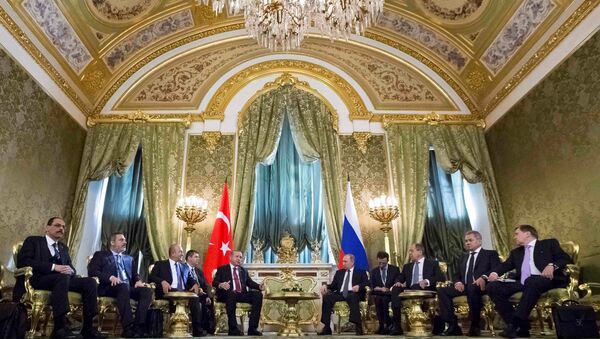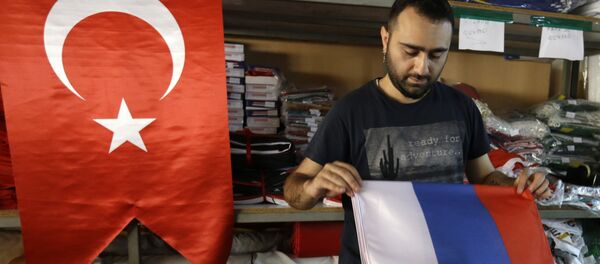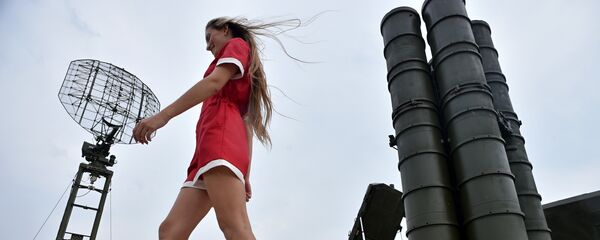Over the past few years Russia and the Republic of Turkey have conducted intensive political dialogue at top level. Contacts with Turkey received a tangible impetus when Putin paid an official visit to Turkey on December 5-6, 2004. At that time the two leaders pledged in a joint declaration to develop bilateral relations into advanced many-sided partnership. Over 30 meetings took place since then.
During Putin’s working visit to Ankara on August 6, 2009, the sides agreed to develop cooperation in many priority areas, including the power industry. They decided to establish a new mechanism of bilateral relations – the High Level Cooperation Council.
On December 1, 2014, Putin paid a state visit to Turkey. On par with Erdogan, he took part in the fifth meeting of the Cooperation Council. Following the meeting, the two signed a package of eight documents on cooperation. On February 7, 2014, Erdogan who was the Turkish prime minister at the time, visited Sochi and met with Putin on the sidelines of the opening ceremony of the Winter Olympic Games.
On September 23, 2015, Erdogan made a one-day working trip to Moscow where he conducted talks with Putin and took part in the opening of a new complex of the Moscow cathedral mosque.
On November 16, 2015, the two leaders held a bilateral meeting on the sidelines of the G20 summit in Antalya.
After a long period of dynamic development, bilateral cooperation went downhill after the Turkish Air Force downed a Russian military aircraft in the Syrian air space on November 24, 2015. For seven months bilateral ties were virtually frozen. In a message to Putin in June 2016 Erdogan expressed his desire to normalize relations and apologized for the death of the Russian pilot. The Turkish leader also emphasized his readiness to do everything for normalizing the traditionally friendly relations between Ankara and Moscow, to jointly react to regional crises and to counter terrorism.
Stage-by-stage restoration of bilateral relations was launched on June 28, 2016 after a telephone conversation of the two presidents.
As a follow-up to the agreements reached by the presidents, the foreign ministers of Russia and Turkey held a working meeting in Sochi on July 1, 2016.
On August 9, 2016, Putin and Erdogan met in St. Petersburg for the first time since the crisis in bilateral relations. At the meeting they agreed to restore cooperation in all areas.
Putin met with Erdogan on the eve of the G20 summit in China’s Hangzhou on September 3, 2016. The leaders discussed restoration of full-scale bilateral cooperation and exchanged opinions on the Syrian issue.
The Syrian issue has also given impetus to the bilateral relations of Moscow and Ankara as the two states along with Iran are the guarantors of a nationwide ceasefire in the Middle Eastern state, that came into effect on December 30, 2016. The three countries have also contributed to the Astana format of the Syrian settlement that resulted in several rounds of talks between Damascus and the representatives of the Syrian armed opposition.
Turkey is one of Russia’s main foreign trade partners. According to customs statistics, in 2015 Russia’s foreign trade with Turkey amounted to $23.3 billion – a decrease by 26.1 percent compared to 2014. Exports amounted to $19.3 billion (a reduction by 22.5 percent) and imports to $4 billion (a drop by 39.4 percent).
In 2016, bilateral trade went down compared to 2015. Reduction in imports from Turkey was caused by the restrictions introduced by Russia on trade with Turkey in the end of 2015.
Russia primarily exports to Turkey mineral products (65.1 percent), metals and metal goods (19 percent). Imports are as follows: machines, equipment and transport vehicles – 33 percent; food products and agricultural raw materials – 27 percent; textiles and textile goods and footwear 16.3 percent and chemical products – 10.6 percent.
Never miss a story again — sign up to our Telegram channel and we'll keep you up to speed!




